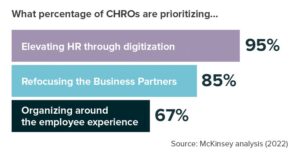Feeling Liberated – what’s changed?
The days of “give it to HR” may soon be numbered. Too often, HR has performed as a “jack of all trades” function, burdened with absorbing responsibilities that don’t have an obvious home. But times are changing. Businesses must respond to a more demanding candidate pool about the strength of their culture and what it stands for. CHROs have a newly powerful voice and a captive audience.
Disruptive environmental forces are causing companies to rethink their human capital strategies and CEOs are leveraging HR executives more than ever before to determine:
- How to maintain a coherent culture with a fragmented workforce, while effectively navigating new hybrid work models;
- How to attract and retain talent as social media influences, societal pressures, and a changing competitive landscape have transformed candidate and employee expectations;
- How to respond to sensitive political events when companies are expected to take a public stance and when staying out of the fray is no longer viable.
CHROs have visibly stepped up to apply their advisory skills to address these immensely challenging subjects, and strengthened their relationships with business executives in the process. HR’s leadership and capability has been evident through all of this in ways not recognized before. The upshot is that HR now has more influence than ever.


